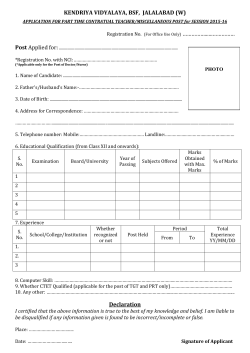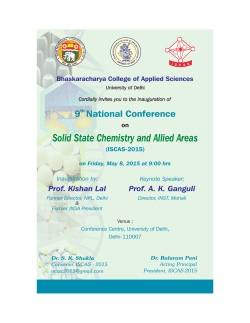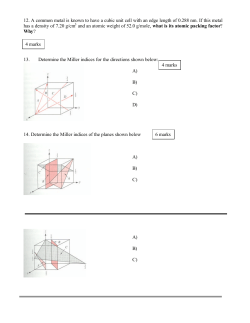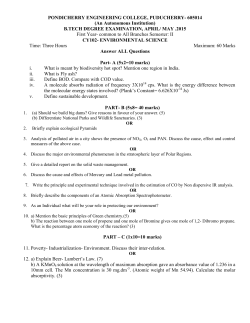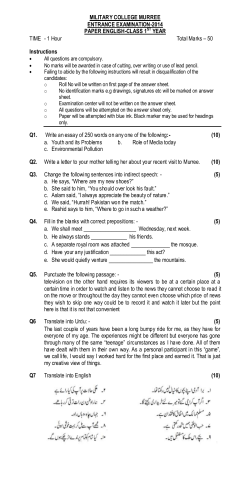
WEL-COME I Semester
WEL WEL--COME TO THE COURSE STRUCTRE AND SYLLABUS OF UNDERGRADUATE PROGRAMMES –B.S.W I Semester w.e.f. Academic Year 2011-12 and onwards 1 COURSE OUTLINE FOR B.S.W PROGRAMME Course Title: B.S.W SEMESTER-I Sl. No. Group Code No. 1 I 1.1 2 I 3 Max. Marks Title of the Paper Total Marks Teaching hours/week IA Sem Exam First Language 20 80 100 5 1.2 Second Language 20 80 100 5 II 1.3 Introduction to Social Work 20 80 100 5 4 II 1.4 20 80 100 5 5 II 1.5 Social Sciences for Social Workers-I (Economics and Sociology) Communication and Counselling 20 80 100 5 6 II 1.6 Social Work Practicum 20 80 100 10 7 III 1.7 Indian Constitution 20 80 100 5 Total for I semester = 700 2 B.S.W SEMESTER-I Paper 1.1 and paper 1.2: Common as per under graduate courses (Bachelor of Arts) 1. English Basic: Detailed Syllabus for B.A. / BSW 1st Year Basic English Teaching Hours : 5 Hours per week (80 Marks per paper of three hours ) (20 Marks for I.A) Pattern of question paper 1) Objective type questions (Five each from prose & Poetry) 2) Reference to context (Two each from prose and poetry to be asked) (One each from prose and poetry to be answered) 3) Essay type Question on prose (One out of two) 4) Essay type question on poetry (One out of two) 5) Short notes (Two each from prose and poetry to be asked) (One each from prose and poetry to be answered) 5X1=5 6) A) Use of Articles B) Use of Prepositions 5X1=5 7) A) Antonyms 5X1=5 B) Synonyms 5X1=5 8) Comprehension 10X1= 10 2X5= 10 10 10 2X5= 10 10 10 10 80 Text Book : Prose And poetry for the Young Reader (Eds) D.K.SEBASTAIN , A.G.XAVIER (MACMILLAN Publishers India Ltd.) Only the following Lessons and Poems are to be studied 1) Water – The Elixir of Life , - C.V Raman. 2) Journey to Niagara, - Charles Dickens. 3) Mrs. Packletide’s Tiger, - Saki. 4) A Deed of Bravery – Jim Corbett 1) 2) 3) 4) On His Blindness, - John Milton The Village School Master, - Oliver Goldsmtih. The Solitary Reaper , - William Words worth. Ozymandias , - P.B.Shelley. 3 The following synonyms and antonyms are to be taught : Synonyms : Abandon, Accident, Ambition, Assail, Banish, Behaviour, Bestow, Bonus, Caution, Cease, Clean, Costly, Conquest, Command, Deed, Desire, Dissent, Error, Evil, Forgive, Faith, Glitter, Hit, Jump, Kindle, Lazy, Magnify, Mellow, Noted, Often, Opponent, Peace, Pretend, Quarrel, Quick, Rational, Realm, Scent, Solace, Tiny, Triumph, Unite, Useful, Vain, Vice, Wander, Wild, Young, Zenith Antonyms : Abolish, Abortion, Abridge, Brisk, Bold, Capture, Cause, Common, Dawn, Defensive, Eat, Eccentric, Eliminate, Fantasy, Famous, Fear, Gaiety, Gay, Heal, Harsh, Ideal, Illegible, Ill, Joyous, Justify, Kind, Lavish, Latest, Luminous, Master, Major, Neat, Notorious, Odd, Pain, Quick, Refuse, Sage, Shut, Tease, Total, Undertake, Utilize, Vain, Vacate, Weighty, Wanton, Yield, Yearn, MODERN INDIAN LANGUAGES (MIL)/ ADDITIONAL ENGLISH Additional English (MIL) Detailed Syllabus for BA / BSW / BA in CCJ 1st Year Semester – I Additional English Teaching Hours : 5 Hours per week (80 Marks per paper of three hours) (20 Marks for I.A) Pattern of question paper 1) Objective type questions 2) Reference to context 3) Essay type Question on the stories (One out of two) 4) Essay type question on storiess (On out of two) 5) Short notes on the stories (Two out of four) 6) Match the word with their meanings 7) Use of words, phrases and idioms (text based) 8) Résumé Writing 10X1= 10 2X5 = 10 10 10 2X5 = 10 2X5 = 10 10 10 80 4 Text Book: Meenakshi Mukherjee (Ed) Let’s Go Home and Other Stories, New Delhi : Orient Blackswan, 2009 The following stories are to be studied : 1. RK Narayan : A Shadow 2. Ruskin Bond : The Meeting Pool 3. Gopi Ganba : Green Parrot in a Cage 4. Khushwant Singh : The Portrait of a Lady 5. Kewlian Sio : Let’s Go Home 6. Anita Desai : Circus Cat, Alley Cat 7. Mulk Raj Anand : The Terrorist 2. Kannada Basic: ©.J./ ©.J¸ï.qÀ§Æèöå./ ©.J.(¹¹eÉ) I ¸É«Ä¸ÀÖgï PÀ£ÀßqÀ DªÀ±ÀåPÀ ¥ÀoÀå ¨ÉÆÃzsÀ£Á CªÀ¢ü: ªÁgÀPÉÌ 5 UÀAmÉUÀ¼ÀÄ 1. 2. 3. 4. 5. 6. 7. ¸ÀA¥ÁzÀPÀgÀÄ : AiÀÄ®è¥Àà »ªÀÄär : ¥ÉÆæ. «dAiÀĪÀiÁ¯Á £ÁUÀ£ÀÆj ¸Á»vÀå ¸À« - 1 ¨sÁUÀ – MAzÀÄ EªÀgÀ AiÀÄÄzÀÞªÉA§ÄzÀw PÀÆægÀ UÀæºÀAiÀÄÄzÀÞzÀAvÉ eÁw ªÀÄvÀÄÛ °AUÀ¤gÀ¸À£À ªÀZÀ£ÀUÀ¼ÀÄ zsÀ¤AiÀÄgÀ ¸ÀvÀå£ÁgÁAiÀÄt ºÉtÂÚ£À ¸ÁÜ£ÀªÀiÁ£À ‘ºÀ¸ÀÄgÀÄ ºÉÆ£ÀÄß’ PÀÈw¬ÄAzÀ (¤ÃlªÀiï, ¸À¥ÀðUÀA¢ü, §ÆgÀÄUÀ, ©¢gÀÄ) PÀ£ÀßqÀ zÀQ̹PÉÆAqÀ CjªÀÅ ªÀÄvÀÄÛ JZÀÑgÀ £ÀªÀÄUÉ ¨ÉÃPÁVgÀĪÀ EAVèõÀ ¨sÁUÀ – JgÀqÀÄ GvÀÍ£À£À (DAiÀÄÝ PÀ«vÉUÀ¼ÀÄ) 50 CAPÀUÀ¼ÀÄ - ¥ÀA¥À ªÀZÀ£ÀPÁgÀgÀÄ PÉÆÃgÀqÀÌ¯ï ²æäªÁ¸ÀgÁªï ªÀÄÆ® : ±ÀgÀ±ÀÑAzÀæ ZÀmÉÆÖÃ¥ÁzsÁåAiÀÄ C£ÀÄ : qÁ.¹zÀÞ°AUÀ ¥ÀlÖt±ÉnÖ ©.f.J¯ï ¸Áé«Ä - PÉ.«.¸ÀħâtÚ PÀĪÉA¥ÀÄ 30 CAPÀU¼ À ÀÄ - qÁ.¸ÀgÀdÆ PÁlÌgï 5 3. Marathi Basic: Syllabus for B.A/BSW/BA-CCJ Semester – I Basic Marathi Teaching Hours : 5 Hours per week Scheme of Examination : a) One paper carrying 80 marks and of 3 hours duration b) Internal Assessment 20 marks Course : Literary form – Short Story Text : Oza – Vyankatesh Madagulkar Saket Prakashan, Aurangabad Distribution of Marks: Q.1. Essay writing (One out of four) 1x16 Q.2. Objective type questions (Eight out of twelve) 8x2 Q.3. Essay type question (One out of three) 1x16 Q.4. Short Notes (Two out of four) 2x8 Q.5. reference to Context (Two out of four) 2x8 4. Hindi Basic: Syllabus for B.A/BSW Teaching Hours : 5 Hours per week SEM I 2011-12 1. Sahitya Sarita Ed. Prof. Jogendrasinha Bisen Orient BlackSwan Private Ltd., Bangalore. Note: Only Prose Section of the book. 2. General Essay 6 5. Praakrit Basic: Teaching Hours : 5 Hours per week B. A/ BSW Part -I. First Semester Basic – Praakrit Teaching hours - 5 hours per week Exam marks - 80+20=100 of 3 hours Duration Text a) MüWûÉhÉrÉÌiÉaÉÇ - 40 marks - 40 marks xuÉmlÉuÉÉxÉuÉS¨ÉqÉç b) Internal Assessment 1. - 20 marks Assignment, Class Records Skill – Development Total 100 Marks Question Paper Pattern First Semester B. A./ BSW Part – I Basic – Praakrit I. New type Questions/ Select the correct answer 10 Marks II. Translate passages (any two out of three) 14 Marks III. Explain with reference to contest (any four out of six ) 12 Marks IV. Essay type from MüWûÉhÉrÉÌiÉaÉÇ (with internal choice) 15 Marks V. Essay type from xuÉmlÉuÉÉxÉuÉS¨ÉqÉç (with internal choice) 14 Marks VI. Short notes (any three out of five) 15 Marks Total 80 Marks 7 6. Sanskrit Basic: Syllabus for B.A/BSW Semester – I Basic Sanskrit Teaching Hours : 5 Hours per week Examination. Marks : One paper carrying 100 marks (80+20) of 3 hours duration. Text : MüjÉÉ cÉÉÂsÉiÉÉ : Samaj Pustakalay, Dharwad. Question Paper Pattern: I. Multiple choice from the prescribed text MüjÉÉ 10 Marks cÉÉÂsÉiÉÉ (Any ten out of twelve) II. (a) Translation and explanation of Verses from 15 Marks the text (Any three out five) (b) Translation of Prose Passages from the text 5 Marks (Any one out of two) III. Explain from the text (Any three out five) 12 Marks IV. Short notes from the text (Any two out of four) 8 Marks V. Essay type question from the text (Any two 20 Marks out of three) VI. Grammer 10 Marka 8 7. Arabic Basic: Syllabus for B.A/BSW Semester – I Basic Arabic Paper : Prose, Poetry and Biography Scheme of teaching : 5 hours per week Prescribed Text Books 1. Al-Qiratul Wadhiha Part-II Prose Lesson No. 5 to 10 By: Waheeduz.zama Al-Kiranvi. Pub.By:Maktaba Husainia Deoband (U.P) 2. Qaseed-e-Burdah (Poetry) Chapter No.4 By: Imam Boosary Pub.By:Azeem Book Dept Deoband (U.P) 3. The Holy Quraan. Sura-balad. Pub.By:Taj Company Mumbai. The question paper should be broadly based on the following pattern. 1) Multiple choice from All text 1x10 = 10 2) Summary from first text with choice 2x7½ = 15 3) R.C. from first text with choice 3x5 = 15 4) Appreciation of verses from second text 3 out of 5 3x5 = 15 5) Question on Sura 1x15 = 15 6) Question on Author and Book 1x10 = 10 ---80 9 8. Persian Basic: Syllabus for B.A/BSW Semester – I Basic Persian Teaching Hours : 5 Hours per week 1. PRESCRIBED TEXT BOOK Following portion only Gulistan(Saadi). Textbook Shahkar-E-Farsi by Hafez Abdul Alim Khan Pub by:-Ram Narayanlal Bani mahdho2 katra road Allahabad(U.P) 2. PRESCRIBED TEXT BOOK Following portion only Az-qasayad-E-Saadi. Textbook Nisab-E-Farsi by Dr.Sayed Azhar Ali Saheb. Pub by:-Sultan Chand & Centers. 47/92/23 Dariya Ganj Dehli-6. 10 9. Urdu Basic: Syllabus for B.A/BSW Semester – I Basic Urdu Teaching Hours : 5 Hours per week Paper –I– Prose & Poetry Prescribed Text I.Detailed Text Naya Adabi Nisab Ed by Azeemulla Haq Educational Book House Aligarh The following lessons only 1. Ek yaadgar wasiyat 2. Hatim ki sakhawat 3. Guzra huwa zamana 4. Apni musibat 5. Mirza Ghalib Gazals 1. Meer dariya hai 2. Dil hi to hai 3. Ye na thi hamari qismat 4. Hum samajhte hain 5. Dafan jab khak me 6. Naseem hai tere kuche me Poems 1. Dariya ki rawani 2. Ek arzoo 3. Husan aur mazduri 4. Mele ki sair 11 II. Hamare pasandeeda afsane 1. Amavas ki raat 2. Aazmaish 3. Naya Qanoon 4. Kalu bhangi III. Essay Eriting IV. Scheme of Examination : Total marks 100 (Theory 80 + Internal Assessment 20 marks) I. Each paper of 100 marks shall carry 20 marks Internal Assessment out of the 20 marks 10 shall be for semester test & remaining 10 shall be for assignment records skill developments. II. In each paper two test shall be conducted for the award of Internal Assessment marks & each of one hour duration for maximum of 20 marks reduced to ten later. First test shall be conducted in 8th week & II test in 12th week of respective semester .The average marks shall be taken as final Internal Assessment marks for assignment marks for the test component. III. The award of the Internal Assessment marks for assignment records skill development shall be based on the submission of the same by the candidates duly certified by the concerned teacher. The question paper should be broadly based on the following pattern Q1. Multiple choice questions from all text 1×10 = 10 Q2. Essay type question on the prose( 1out of 2) 1×10 = 10 Q3. RC from first text (4 out of 6) Q4. Summary of the poem ( 1out of 2) 1×10 = 10 Q5. Appreciation of verses( from Gazals only) (4 out of 6) Q6. Summary Essay type question on non-detailed 1×10 = 10 ( 1out of 2) Q7. Short Note question 1×10= 10 Q8. Essay Writing 12 Syllabus for BSW Semester – I Teaching Hours : 5 Hours per week Paper -1.3: INTRODUCTION TO SOCIAL WORK Objectives: 1. 2. 3. 4. Understanding social service tradition in India Understand social work profession, values, Ethics and Charity to professionalization. Understand the history of social work in India and west. Understand goals of social work profession. Unit I: Social Work- Meaning, Definition, Objectives, Nature, Scope and principles of social work. Relation and distinction between social services, social reform, social welfare & social work. Unit II: Social Work Profession- Meaning and characteristics, beginning of social work education, social work values, and ethics, professional & voluntary social work - interface. Unit III: Over-view of the Historical development of social work in India – Ancient, Medieval and Modern – with special reference to: Ancient - Social service tradition in Indian culture, religious roots of charity and philanthropy. Role of institutions like the Joint family, the Caste groups and the Panchayats in meeting human needs. The emergence of the rationalistic – humanistic tradition. Medival - Social reform movements, contribution of major saints and social reformers of the 19th and 20th century and their contributions to social welfare. Modern - Dalit movement, Gandhian ideology, Saryodaya and Bhoodan movement. Role of state and voluntary organizations in social welfare in India and in the current situation. Unit IV: History of social work in west (UK &USA)- Organized charity, clinical social work, ecological social work, social work education - beginning of social work education, knowledge, & professional associations. Unit V: The Goals of Social Work - Developmental/ Promotional/ Remedial/ Ameliorative- Radical concepts of social reform. Values of the professional Social Work - belief in the inherent worth and dignity of the person, acceptance of physical, emotional, social and spiritual needs of the individual, capacity of the individual for growth and change, be involved in his/her life, and the right to self-fulfillment. Bibliography: 1. Frink.A.B: The Field of Social Work, New York, Henry Holl and Co. 1945 2. Friedlander Walter A and Apte Robert Z: Introduction to Social Welfare, New Delhi, PrenticeHall.1982. 3. Friedlander Walter A: Concepts and Methods of Social Work, New Delhi, Prentice-Hall.1964. 4. Ganguli.B.N: Gandhi’s Social Philosophy, Delhi, Vikas Publishing House, 1973. 5. Gore.M.S: Social Work and Social Work Education, Bombay, Asia Publishing House, 1965. 6. Gupta, Manju: Child Abuse – A Social Work Perspective, Mangal Deep Publications, Jaipur, 2001. 13 7. Jainendra Kumar Jha: An Introduction to Social Work, Institute for Sustainable Development, Lucknow, and Anmol Publications Pvt., Ltd., New Delhi 2002. 8. Jacob.K.K. (Ed) Social Work Education in India – Retrospective and Prospect, Himansu Publications, Udaipur, 1991. 9. Lawani.B.T. Social Work Education and Field Instructions, Center for Social Research and Development, Pune, 2002. 10. Marulasiddaiah.H.M. (Ed) Bharata Samajakarya Vishwakosha, Vol.I, Kannada Visvavidlaya, Hampi, 1994. 11. Moorthy, M.V: Social Work – Philosophy, Methods and Fields, Karnataka University, Dharwad, 1974. 12. Moorthy, M.V and Narayana Rao S: Field work in Social Work, Dept of Sociology and Social Work, Andra University, Waltair, 1970. 13. Publication Division, Ministry of Welfare, Govt of India: Encyclopaedia of Social Work in India (All Volumes) 1987. 14. Skidmore, Rex A and Thackeray, Milton G: Introduction to Social Work, Prentice Hall, Englewood Cliffs, New Jersey, 1982. 15. Stroup, H.H. Social Work – An Introduction to the Field, New Delhi, Eurasia Publishing House 1960. 16. University Grants Commission. Review of Social Work Education in India, Retrospect and Prospect, University Grants Commission, New Delhi, 1980. 17. Wadia, A.R: History and Philosophy of Social Work in India, Bombay, Allied Publishers, 1968. 18. Yelaja, S.A.: Ethical Issues in Social Work, Springfield, Charles, C. Thomas, 1982. 19. Young husband, E: Social Work and Social Values, Vol.III, George Allen and Unwin, 1967. Paper -1.4: SOCIAL SCIENCES FOR SOCIAL WORKERS – I (Economics and Sociology) Objectives: 1. Understanding the concepts to examine social phenomenon. 2. Understand the relevance of Sociology and Economics for Social Work. 3. Understanding processes of Social Change and Conflicts. Unit I: Relationship between Economics and Social Work. Elementary concepts in Economics Theory of value. Creation and distribution of wealth. Economics of Underdevelopment. Urban rural continuum. Unit II: Facts and figures of poverty, unemployment, urbanization, industrialization, social services, education, housing and health. Underdevelopment; Its genesis and manifestations: migration and population. Unit III: Planning for Growth; Indian experiences during the post – independence period with respect to specific programmes: Analysis of basic economic strategies. Scope of Sociology as a discipline; Sociology and the other Social Sciences; Relevance of Sociology for Social Work. Unit IV: Society and Culture: Society and the individual – Social Interactions, The Process of Socialization mechanisms and the agents of Socialization. Social Control and Deviance – The Process and Mechanisms of Social Control: Social Causation and Consequences of deviance. Social Groups: Primary and Secondary relation: Type of Social Groups; Organizations and bureaucracy. 14 Unit V: Social Inequality and Social Stratification. Class and Caste Stratification. Gender roles and Gender Inequality. Urban, Rural and Tribal Society Social Change – Theories of Social Change, Sources of Change, Social Development; Collective Behavior and Social Movements. Bibliography: 1. Ahuja, Ram: Society in India, Rawat Publications, Jaipur, 1999. 2. Ahuja, Ram: Social Problems in India, Second Edition, Rawat Publications, Jaipur, 1997. 3. Bagchi, A.K.: The Political Economy of Underdevelopment, Cambridge, Cambridge University Press, 1982. 4. Bardhan, P: The Political Economy of Development in India, Delhi, Oxford University Press, 1984. 5. Bottomore, T.B.: Sociology: A Guide to Problems and Literature, London, George Allen and Unwin, 1962. 6. Brahmananda, P.R and Panchaucki, V.R.: The Development Process of the Indian Economy, Bombay, Himalaya Publishing House 1987. 7. Chaudhri, P: The Indian Economy: Poverty and Development, Bombay, Vikas Publishing, 1978. 8. Davis, K: Human Society, New York, Macmillan Company, 1963. 9. Hanumantha Rayappa p., and Grover, D: Employment Planning for the Rural Poor, New Delhi, Sterling Publishers, 1980. 10. India: Towards Equality: Report of the Committee on the Status of Women in India, New Delhi, Ministry of Education and Social Welfare, 1974. 11. Inkeles, A: What is Sociology? An Introduction, Poona, Deshmukh Prakashan, 1982. 12. Johnson, Harry M: Sociology- A Systematic Introduction, Allied Publishers Ltd,. New Delhi, 1966. 13. Karve, I: Hindu Society: An Introduction, Poona, Deshmukh Prakashan, 1968. 14. McIver, K.B. and Page, C.H: Society: An Introductory Analysis, Madras, Macmillan India Limited, 1985. 15. Mayer, K.B. and Buckley, W: Class and Society, New York, Random House. 16. Shankar rao, C.N: Sociology- Primary Principles, S.Chand and Company Ltd., New Delhi, 2002. 17. Samuelson, P.A.: Economics: An Introductory Analysis, New York, Mc Graw Hill Book Co. inc., 1961. 18. Srinivas, M.N: Caste in Modern India and other Essays, Bombay, Asia Publishing House, 1962. 19. Srinivas M.N: Social Change in Modern India, Bombay allied Publishers, 1966. 20. World Bank: World Development Report; 1981, New York, Oxford University Press, 1978. Paper- 1.5: COMMUNICATION AND COUNSELLING Objectives: 1. To help to have basic understanding of Communication and Counselling. 2. To enhance the skill of effective oral communication at different situations. 3. To enhance the skill of effective written and visual communication development. Unit I: Unit II: Communication: meaning and importance of communication, process of communication. Key elements in the communication process- communication message, audience, channel of communication, verbal & non-verbal communication, basics of communication. Interpersonal communication, interviewing- objectives, principles of interviewing, listening, qualities of effective communicator. 15 Unit III: Unit IV: Unit V: Seminars, conferences, lectures, group discussions, panel discussion, symposium, workshop, role playing, simulation exercises, written communication, report writing, letter writing, articles/ essay writing, games, brain storming, street play, Visual aids in communication, poster making, use of notice boards, flip charts, flash cards, photographs, pamphlets, slide shows, mass communication, television, exhibition, newspapers & magazines, advertisements radio, films, VCD/DVD. Counseling: definition, meaning & relevance of counseling as an approach of social work, ethics of counseling. Counselor as a professional – Principles of Counseling. Counselor – counselee relationship, process of counseling – qualities of an effective counselor – practical counseling skills, types of counseling – interrelationship between counseling and psychotherapy. Practice of counseling in family counseling centers, family courts, counseling bureau- premarital and marital counseling, vocational counseling centers, mental health centers, child guidance clinics, correctional institutions, de-addiction & rehabilitation centers, educational institutions. Bibliography: 1. Brown, Leland: Communicating Facts and Ideas in Business, Prentice-Hall Inc., Englewood Cliffs, New Jersey, 1970. 2. Dave, Indu: The Basic Essentials of Counseling, Sterling Publishers Pvt., Ltd., New Delhi, 1983. 3. Desai, M.M. (Ed): Creative Literature and Social Work Education, Somaliya Publications Pvt. Ltd., Bombay, 1979. 4. D’souza, Y.K: Communication Today and Tomorrow, Discovery Publishing House, New Delhi, 1999. 5. Fisher, Dalmar: Communication in Organizations, Second Edition, Jaco Publishing House, Mumbai, 1999. 6. Fullmer, D.W. and Bernard, H.W: Counseling: Content and Process, Thomas Press India, New Delhi, 1972. 7. Kennedy, E: On Becoming a Counselor – A Basic Guide for Non-Professional Counselors, Gill and Macmillan, Delhi, 1977. 8. Melkote, Srinivas R: Communication for Development in the Third World – Theory and Practice, Sage Publications, New Delhi, 1991. 9. Mohan, Krishna and Banerji, Meera: Developing Communication Skills, Macmillan India Ltd., Delhi, 1990. 10. Murphy, Robert D: Mass Communication and Human Interaction, Houghton Mifflin Company, Boston, 1977. 11. Narang, Vaishna: Communicative Language Teaching, Creative Books, New Delhi, 1996. 12. Narayana, Rao S: Counseling Psychology, Tata McGraw-Hill Publishing Company Ltd., New Delhi, 1981. 13. Pollock, Thomas Clark; Sheridan, Marion C; Ledbetter, Frances and Doll, Ronald C: The Art of Communicating, The Macmillan Company, New York, 1955. 14. Robert, G. Madden: Legal Issues in Social Work Counseling and Mental Health, Sage Publications India Pvt., Ltd., 1988. 1.6: Social Work Practicum: The Practicum for Social Work curriculum is designed to provide a variety of opportunities to develop and enhance skills. Opportunities range from those that aid learning, observation and analysis of the realities and experience participation in social intervention. Besides, the tasks are so organized as to help the learner acquire 16 learning skills, enrich those already acquired, and enhance these for complex situations. Gradually, the learner is encouraged to move to being an independent worker. Social Work Practicum includes Fieldwork component in every Semester after Theory Examination to the Sixth Semester. The Practicum for B.S.W Course will have the following components: · · · · · · Field Visits / Observation Visits / Agency Visits. Interaction with Social Work Practitioners. Structured Experiences Laboratory. Rural Camp. Concurrent Field Work. Research Project Field Work Programme during I and II Semesters: Objectives of Field Work Programme: · · · · · To develop among students an understanding about different approaches of providing help to people in need. To familiarize the students with the professional role of social workers. To develop self-awareness and orientation to team work. To develop introductory skills in use of programme media. To develop skills in report writing and use of supervision. During first year of the course, observation visits to welfare, educational, developmental, industrial and allied agencies will be arranged. The students will be guided to understand the processes of implementation of various programmes. Following shall be the outline of fieldwork activities: · · · · · · · · Orientation to field work – 12-15 sessions/semester Observation visits – 12-15 visits/semester Structured Experiences Laboratory – 10 sessions/semester Skill workshops. Interaction with social work practitioners. Individual conference. Group conference. Viva-voce. Assessment of Field Work at the end of the Semester: In each Semester, a minimum of 15 days are to be spent on field work with 10 hours per week. The students is placed under the guidance of a faculty member and he / she is required to submit the Field Work record once in a week to the faculty member and receive necessary guidance from him / her. The Field Work Record, submitted by the student at the end of each semester, should be certified by the both the concerned faculty member as well as the head of the institution to the effect that the work has actually been done by him/her. The student is required to submit the fieldwork record to become eligible to take theory examination in each semester and if a student fails to submit the field work record before the commencement of theory 17 examination he / she shall not be allowed to write the theory examination. Fieldwork record shall only be evaluated when the candidate appears for the viva-voce examination. The Field Work Record, submitted by the student, will be evaluated jointly by one internal and one external examiner who conduct viva-voce on fieldwork. 1.7 INDIAN CONSTITUTION Teaching Hours : 4 Hours per week Additional (Mandatory) paper for all degree courses Objectives To provide constitutional literacy for every students at the graduate level. a) To make the student conversant with his citizenship role as prescribed under the constitution. b) To make a students understand appreciate and internalize the glorious struggles for freedom that culminated in the formulation of the Constitution and to emulate the constitutional values enshrined in the preamble of the constitution. MODULE: I Significance of the Constitution ; Making of the constitution – role of the constituent Assembly, salient features, the Preamble, Citizenship, Procedure for Amendment of the constitution. (10 Hours) MODULE: II Fundamental Rights, the Right to Equality, the Right to Freedom, the Right against Exploitation, the Right to Freedom of Religion, Cultural and Educational Rights, the Right to constitutional Remedies. 18 (10 Hours) MODULE: III Nature of the Directive Principles of State Policy, difference between of fundamental rights and directive Principles of State Policy – Implementation of Directive Principles of State Policy, Fundamental Duties. (8 Hours) MODULE: IV Union Government – Powers and Functions of the President, the Prime Minister, Council of Ministers. Composition, powers and functions of the Parliament, Organization of Judiciary, Jurisdiction of the Supreme Court, Independence of Judiciary. (12 Hours) MODULE: V State Government – Powers and Functions of Governor, Chief Minister, Council of Ministers. Composition, Powers and Functions of State Legislature, Local Government and the Constitution, Relation between the Union and the states. (10 Hours) Books of Reference : 1. M.V.Pylee, An Introduction to the Constitution of India, New Delhi, Vikas, 2005. 2. Subhash C. Kashyap, Our Constitution : An Introduction to India’s Constitution and constitutional Law, New Delhi, National Book Trust, 2000. 19 3. Durga Das Basu, Introduction to the Constitution of India, New Delhi, Prentice Hall of India, 2001. 4. D.C.Gupta, Indian Government and Politics, VIII Edition, New Delhi, Vikas, 1994. 5. J.C.Johari, Indian Government and Politics, Delhi, Sterling Publishers, 2004. 6. V.D.Mahajan, Constitutional Development and National Movement in India, New Delhi, S. Chand and Co., latest edition. 7. Constituent Assembly Debates, New Delhi, Lok Sabha Secretariat, 1989. 8. Granville Austin, Working of a Democratic Constitution : The Indian Experience, New Delhi, Oxford University Press, 1999. 9. A.P.Avasthi, Indian Government and Politics, Agra, Naveen Agarwal, 2004. 10. S.A.Palekar, Indian Constitution, New Delhi, Serials Publications, 2003. 11. Brij Kishore Sharma, Introduction to the Constitution of India (Second Edition), New Delhi, Prentice-Hall of India, 2004. 12. H.M.Rajashekhar, Understanding the Indian Constitution, Mysore, Prabodha, 2005. 13. J.N.Pandey, Constitutional Law of India, Allahabad. Central Law Agency, 2004. 14. JZï.JA. gÁd±ÉÃRgÀ ¨sÁgÀvÀzÀ ¸ÀgÀPÁgÀ ªÀÄvÀÄÛ ªÉÄʸÀÆgÀ, QgÀt ¥ÀæPÁ±À£À, 2004 15. ¨sÁgÀvÀzÀ ¸ÀA«zsÀ£À 9 1975gÀ CUÀ¸ïÖ 10gÀªÀgÉUÉ ªÀiÁ¥ÁðmÁzÀAvÉ), ¨sÁgÀvÀ ¸ÀgÀPÁgÀzÀ ¥ÀgÀªÁV, PÀ£ÁðlPÀ ¸ÀgÀPÁgÀzÀ ªÀÄÄzÀæt, ¯ÉÃRPÀ ¸ÁªÀÄVæ ªÀÄvÀÄÛ ¥ÀæPÀluÉUÀ¼À ¤zÉÃð±ÀPÀjAzÀ ªÀÄÄ¢ævÀªÁV ¥ÀæPÀnvÀªÁVzÉ, 1976. *********************************************** 20
© Copyright 2026
